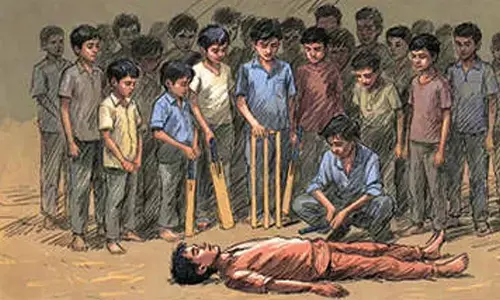Understanding and addressing domestic violence: A psychological perspective

Losing his father at the age of 10 significantly shaped his world, plunging it into gloom that further amplifies the anxieties.
Q: Last week, a woman came to my counselling centre and confided in me about a painful experience. Her husband slapped her, and she understandably feels unable to accept such behaviour. She has decided to consider divorce, and her mother-in-law isn’t allowing her to go out with her husband. She wonders why such things happen to her, especially given her kind and honest behaviour. Already she lost her parents in an accident just five years ago.
Losing his father at the age of 10 significantly shaped his world, plunging it into gloom that further amplifies the anxieties. Witnessing his father’s violence towards his mother during arguments might have inadvertently imprinted a harmful pattern of resorting to aggression as a way to control situations. From a young age, he navigated the constant anxieties and insecurities fostered by a nagging mother and an unsafe home environment. To escape these anxieties, he found solace in drinking and the company of friends, seeking a temporary sense of security within that circle.
People hit their spouse or kids because if a person has a habit of taking misdirected anger out on their loved ones, it may be due to the inability to address the situation that is provoking anger. This is a defense mechanism called “displacement.” Taking anger out on a loved one might provide a small moment of relief, but it will not solve the real issue; instead, it brings double trouble and may lead this crisis to an unexpected level.
We need to understand your husband’s “object relationship”. The first “object” in an individual is usually an internalized image of the mother. Internal objects are formed by the patterns in one’s experience of being taken care of as a baby, which may or may not be accurate representations of the actual, external caretakers. Later experiences can reshape these early patterns, but objects often continue to exert a strong influence throughout their life.
Some situations, particularly the way of using certain words, behaviours, and expressions, may trigger the traumatic experience of the past, making your husband feel unsafe and threatened. We need to understand these triggers. Why do these triggers make him respond to that in unhelpful behaviour? What is a trigger? A trigger is an instance when you become physically and/or emotionally reactive to something that relates to the trauma you have experienced. These symptoms and feelings are part of your brain’s natural response to unsafe experiences from the past. You need to understand these triggers properly.
When your husband is in anger, he might have warned you out of anger, “don’t say these words to me.” We need to understand he is trying to protect his territory of a safe zone. Be empathetic with him whenever there is an emotional situation. Have respectful and empathetic conversation with him. If possible, both of you can go to a therapist to resolve the issues between you.




